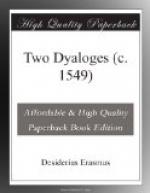and yet forsothe they hate not the thing so greatly.
Boni. That is as trewe as the gospell. Bea.
Consyder me nowe and marke I beseche the howe the
goodes of orphanes, pupylls, wardes, and fatherlesse
chyldren be comunely ordered and vsed, how wylles
and testamentes be executed and performed, how legacyes
and bequethes be communelye payde, Naye howe moche
cleueth and hangeth fast in the fyngers of the executors
or with them that mynyster and intermedle with the
goodes of the testatours. Boni. Many tymes
they retayne and kepe in theyr handes all togy||ther.
Bea. Yea they loue to playe the thefe well
inoughe, but they loue nothynge worse then to here
of it. Boni. That is very trewe. Bea.
Howe lytle dyffers he from a thefe whiche boroweth
money of one and other and so runneth in dette,
with this intent and purpose that yf he maye escape
so or fynde suche a crafty colour or a subtyle shyft,
he intendeth neuer to paye that he oweth. Boni.
Paraduenture he maye be called warer or more craftier
the a thefe is in dede but no poynt better, for
it is hard chosyng of a better where there is neuer
a good of them bothe. Bea. yea but althoughe
there be in euery place a great nombre of such
makeshyftes and slypper marchauntes yet the starkest
knaue of the all can not abyde to be called thefe.
Boni. God onely knoweth euery manes hart
and mynd, and therfore they are called of vs men
that are runne in dette or fer behynde the hande,
but not theues for that soun||deth vnswetely and
lyke a playne song note. Bea. What skyllys it
howe they be called amoge men yf they be theues
afore god. And where you say that god onely
knoweth euery mannes hart and mynde, euen so euery
man knoweth his owne mynde, whether in his wordes
& doynges he entende fraude, couyn, dysceyte, and
thefte or no. But what say ye by hym whiche
when he oweth more then he is worthe, wyll not stycke
to lashe prodygallye and set the cocke vpon the
hoope, and yet yf he haue any money at all lefte
to spende that a waye vnthryftely, and when he hathe
played the parte of a knauyshe spendall in one cytie
deludinge and disceyuyng his creditours, ronnes
out of this countre and getteth hym to some other
good towne, and there sekynge for straugers and
newe acquayntauce whom he may lykewyse begyle, yea
and playeth many suche lyke partes and shameful
shiftes. I praye the tell me dothe not suche
a ||greke declare euydentlye by his crafty dealynge
and false demeanour, what mynde is he of? Boni.
yes suerly as euydentlye as can be possible.
But yet suche felowes are wonte to colour and cloke
theyr doynges vnder a craftie pretence. Bea.
With what I beseche the? Boni. They saye
to owe moche and to dyuers persones is communely
vsed of great men, yea and of kynges also as well
as of them, and therfore they that intende to be
of that disposycyon wyll beare out to the harde
hedge the porte of a gentylman and soo they wyll
be taken and estemed for gentilmen of the commune




